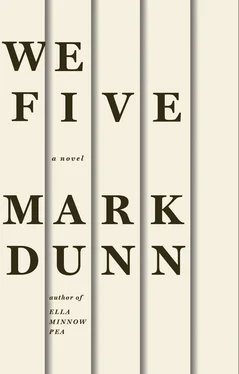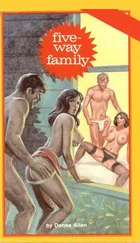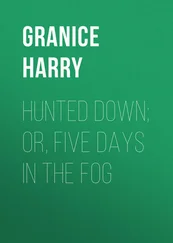Mrs. Barton’s voice became adamantine: “My darling dear! You are neither my keeper nor my turnkey. It is unavoidable illness that has placed me with frequent inconvenience upon this cot, but I am still free and unbound in thought and spirit; whatever control you feel you exercise over me is illusory.”
“If you have done, Mamma, I will conclude this most uncomfortable interview by stating that if you marry Dr. Osborne, I shall very likely kill myself.”
Mrs. Barton turned to look at nothing at all upon the bedroom wall. “Mind, just don’t throw yourself down the well and pollute the town drinking water.” Then, turning back to her daughter’s dorsum with a sad moan of repentance: “You are so very fond of Molly. Would you not wish to have her for a stepsister?”
“You know that in a very real sense Molly is already my sister. Molly and Jane and Carrie and Ruth. We are, all of us, much more than mere friends. There is no need for you to marry a frequently intoxicated tooth-tugger to have what I, in point of fact, have already. Now I’m very late, Mamma, and I’m keeping the other girls. You know we walk together, and when one of us is late we are all late. Mrs. Colthurst doesn’t like that.”
“Maggie?”
“Yes?”
“Mr. Osborne has already put things into motion. He has asked me to marry him.”
Maggie took a deep breath and exhaled slowly to steady herself. “I rather suspected.”
“And now that it is become a very real thing, have you anything new to say in response?”
“Anything new ? No, Mamma, I have not.”
Maggie moved with a heavy tread to the door.
“Are you going to leave without kissing me?”
“I’ve kissed you already.”
With that, Maggie Barton betook herself in great haste down the steps and then flew out the front door and down the lane, whilst her mother sate up in bed and bowed her head in silent lament.
Then Clara Barton raised her head and shook it, and shook her shoulders as if to wrest herself free of a tangible burden placed thereupon, whilst saying to herself, “I do not live only to satisfy the whims of my selfish, benighted daughter. And I will not have this special day spoilt!” Subsequently, she stretched out her arms and yawned and embraced the morning in a mood that was uplifted by calling to mind Osborne’s visit the previous day under the pretext of administering drops to clarify his patient’s vision. Yet the visit carried a far more consequential purpose: the bestowal of a formal proposal of marriage. This recollection was succeeded by a recurrence of the rapturous thought that Osborne was returning the next after noon — this very after noon — to hear her answer!
Clara Barton had deferred that answer to give herself the opportunity to talk the matter over with Maggie, but she had lost courage the evening before, and this morning woke feeling defiantly independent of her daughter’s self-imposed jurisdiction. That assertion of maternal liberty was validated when, without even raising the matter with her, Maggie had expressed an opinion that was severally predictable, very much to the point, and altogether maddening.
But such thoughts were not without momentary repining: “I should have discussed the proposal of marriage with her at some length, for, yes, as my daughter, Maggie is entitled to some opinion in the matter. But what would it serve? Maggie is a stubborn, wilful girl, but she isn’t the mistress of this house! If only she could find a husband of her own and set herself up elsewhere — someplace where she may decide things which have naught to do with me. Would that Mrs. Lumley’s son Henry did ask her to be his wife, and then gave up the nautical profession and took up the vocation of his greengrocer father. Then she would be happy and I would be happy and there would be cabbages and radishes for everyone concerned.”
Mrs. Barton’s thoughts now turned to the girls who formed “We Five.” “Each of those five garden flowers are at the height of bloom and blow, and yet attachments go wanting. Is there not a single man who durst intrude upon that circle of sisterly affinity? Perhaps a good many men would have them if they would only place themselves in situations of inviting eligibility. But how is such a thing possible when all they do is sit in that back room and sew and knit and squint in the darkness and cackle amongst themselves like old hens?”
Clara Barton glanced at the eye-wash cup set upon the table next to her bed. A feeling of warm affection overspread her. Then she smiled. She bethought her of the man she esteemed — a man who had taken such good care of her through her recent illness, though he was clearly not permitted by law to do so — a man who would take even better care of her in other places than simply beside the bed, and her smile broadened with this thought, and then a frisson of something very much like love shot through her body. She fell back against the mattress in the manner of a giddy schoolgirl, hugging her pillow to her chest as if it were a newly received valentine she should place close to her heart. In the next moment, a new thought suddenly intervened; she wondered if Maggie had put away whatever it was she had purchased from Mrs. Lumley (Clara had asked for broccoli sprouts), or had it all been left downstairs to wither without attendance?
Food was on her mind, for her appetite had returned. And it was all due to Dr. Osborne — attributable both to his physician’s skills, which he had acquired through years of opportunistic study and informal apprenticeship, and to the healing wonders that naturally derive from a man’s loving heart.
A heart the likes of which her daughter Maggie had yet to behold.
San Francisco, California, U.S.A., April 1906
(from
We Happy Five,
by Grady Larson)
Molly swiveled full circle in her father’s dental chair. Then she turned herself around in the opposite direction, giggling like a little girl. Attending the delight in his daughter’s voice, Michael Osborne entered the dental parlor from the living quarters in the back of the flat, which the two shared. He was whipping up lather in his shaving cup with his brush. “If you aren’t careful, you’re going to auger that chair right down into Mrs. Dillingham’s front parlor. And I’ll leave you to contend with her wrath all by yourself.”
Molly stopped the chair from revolving. She dizzily wagged a forefinger at her father. “Don’t be silly. You always come to my rescue. That’s what fathers are for: to love, protect, and defend their children, no matter how monstrous their behavior.”
“Explain to me how you can be on the watch for Maggie when you’re nowhere near the window.”
Molly hopped out of the chair, grabbing one of the arms to stabilize herself. “To which window are you referring, Papa? The one in this parlor that is of absolutely no use? Perhaps you haven’t noticed, but that big tooth blocks our view of nearly everything. I must go to the rear of the flat if I’m to see anything of Polk Street.”
Osborne crossed to the window at issue and gazed proudly upon his recent purchase: a large ceramic sculpture in the shape of a tooth. It had the words “Osborne Dental Offices” painted on it in big black letters. The tooth hung from an iron rod projecting from the lintel of the window. The morning was breezy; the tooth rocked gently and squeaked.
“It is quite large, isn’t it? Hum. Would it have been better for me to have bought myself a smaller one?”
Molly walked over to the window as well, some of the strands from the swirl of long blond hair that had been gathered atop her head escaping and flying off to one side. “Oh, I like it that size,” she said, looking it over. “It’s a real attention-grabber. And it’s very funny. It’s as if one day a fairytale giant came to you with a toothache and he let you keep the tooth after you’d pulled it.”
Читать дальше












